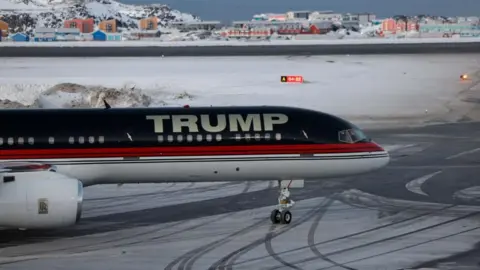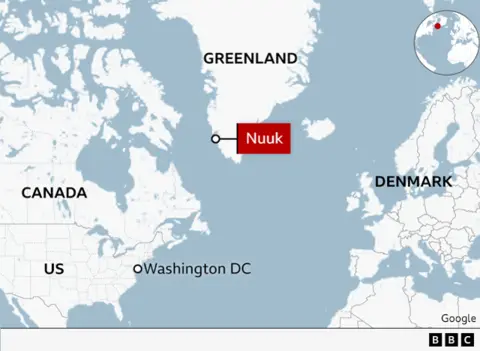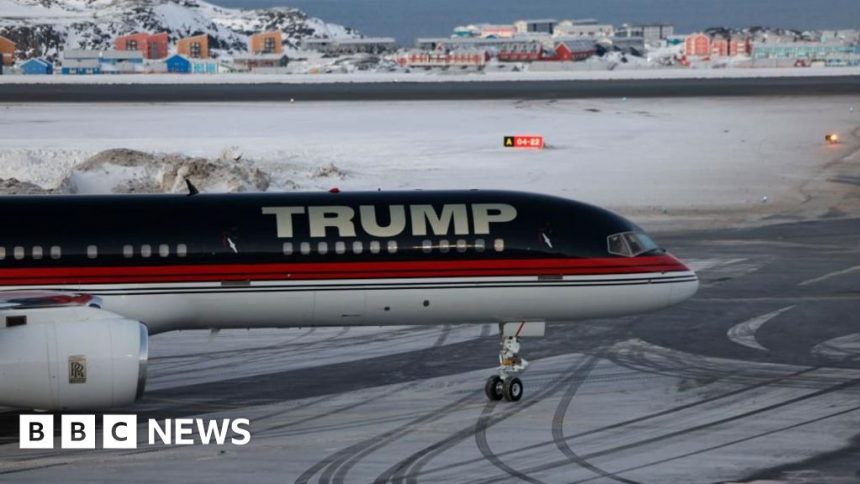Russia keeping close eye on Trump’s claim to Greenland
 EPA-EFE/REX/Shutterstock
EPA-EFE/REX/ShutterstockKremlin spokesman Dmitry Peskov has said Russia is closely monitoring the situation, after US President-elect Donald Trump refused to rule out military action to take Greenland from Denmark.
Peskov said the Arctic was in Russia’s “sphere of national and strategic interests and it is interested in peace and stability there”.
Trump’s remarks on Greenland – a largely autonomous Danish territory – have drawn a warning from European leaders.
EU foreign affairs chief Kaja Kallas has stressed that “we have to respect the territorial integrity and sovereignty of Greenland”, and Germany’s Olaf Scholz has made clear that “borders must not be moved by force”.
Trump said earlier this week that the US needed both Greenland and the Panama Canal “for economic security”, and refused to rule out using either economic or military force in taking them over.
He also referred to the border with Canada as an “artificially drawn line”. Denmark and Canada are both close Nato allies of the US.
Dmitry Peskov said Trump’s claims were a matter for the US, Denmark and other nations, but Russia was watching the “rather dramatic” situation surrounding his remarks. “We are present in the Arctic zone, and we will continue to be present there,” he said.

Outgoing US Secretary of State Antony Blinken sought to dampen concern about the president-elect’s remarks during a visit to Paris: “The idea is… obviously not a good one, but maybe more important, it’s obviously one that’s not going to happen.”
About 56,000 people live in Greenland, and it is home to US as well as Danish military bases. It also has considerable untapped mineral and oil wealth.
Greenland Prime Minister Mute Egede has been pushing for independence, although the territory’s economy relies heavily on Danish subsidies.
Both he and the Danish leader have emphasised that it is “not for sale” and that its future is in the hands of Greenlanders themselves.
UK Foreign Secretary David Lammy played down Trump’s comments, although he acknowledged the “intensity of his rhetoric and the unpredictability sometimes of what he said can be destabilising”.
Danish Prime Minister Mette Frederiksen has said Copenhagen has a clear interest in ensuring that the US – “absolutely its closest ally” – plays a key role at a time of rising tensions in the North Atlantic, particularly involving Russia.
The European Commission said Trump’s threat to Greenland was “extremely theoretical” and “wildly hypothetical”, considering he was not yet in office.
However, it has confirmed that Greenland, as an overseas territory, does come under a mutual assistance clause requiring all EU states to come to its aid in case of attack.
The Kremlin ridiculed the European response, suggesting it was reacting “very timidly… almost in a whisper”.
Last week, Greenland’s leader said the territory should free itself from “the shackles of colonialism”, although he made no mention of the US.
A former Greenland foreign minister, Pele Broberg, who now heads the biggest opposition party, told the BBC that most Greenlanders he talked to believed the US was vital for their defence and safety.
“We are part of the North American continent, that’s why the defence of the US is in such a great place with regards to Greenland, because we create a buffer zone that doesn’t need to be militarised.”
He has called for a “free association agreement” with the US covering trade and defence which would give Greenland independence but hand the US responsibility for security.
Trump’s allies have reinforced his views on Greenland.
Keith Kellogg, chosen by Trump to bring an end to the war in Ukraine, said a lot of the president-elect’s remarks on Greenland made sense, “putting the United States in a position of global leadership”.
Republican congressman Mike Walz told Fox News that the issue was “not just about Greenland, this is about the Arctic”, because Russia was trying to take control of the polar region, with its mineral and natural resources.
“Denmark can be a great ally, but you can’t treat Greenland, which they have operational control over, as some kind of backwater – it’s in the Western hemisphere.”







